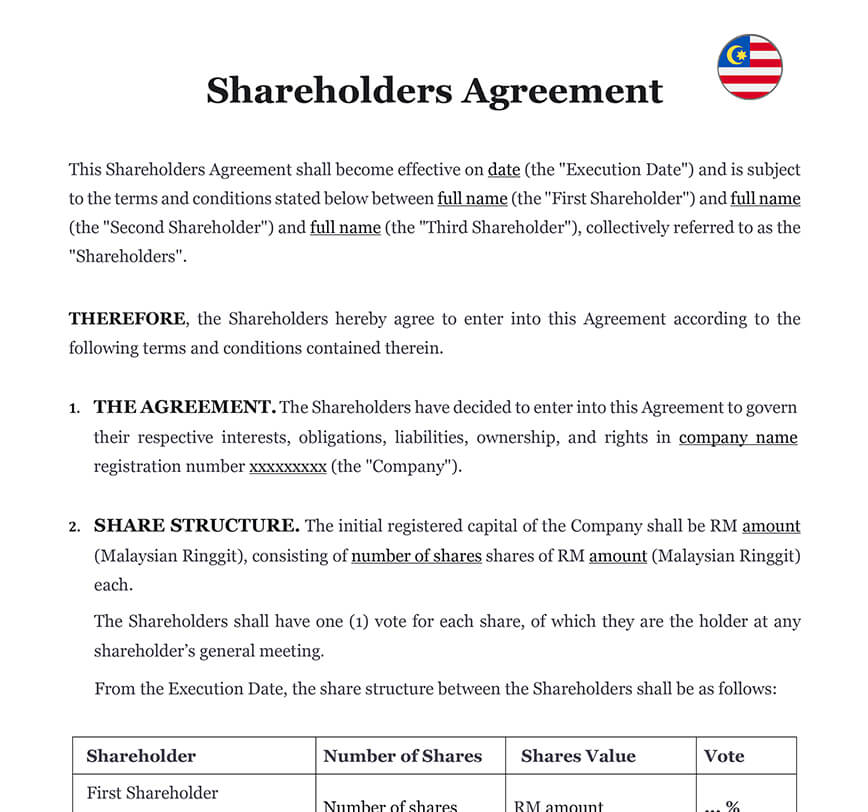Ready to use legal template
Drafted by experienced lawyers
Compliant with Malaysian law
Ready to use legal template
Drafted by lawyers
Compliant with Malaysian law
Home › Business contracts › Shareholders agreement
Learn more about Shareholders Agreement in Malaysia
A Shareholders Agreement is a legal document that describes how the company will be managed to ensure its smooth operation. This type of agreement covers the company’s business strategy, dividend policy, capital structure and board composition. It also describes the rights, duties and obligations of the main shareholders, including the owners, directors and investors of the company. Download this sample Shareholder Agreement drafted specifically to be used in Malaysia. This Shareholders Agreement is easy to customize and includes all the necessary clauses you need to protect yourself. You can also contact our lawyers to assist you in this process.
Table of contents
-
What is a Shareholders Agreement?
-
Why use a Shareholders Agreement?
-
What is included in the Shareholders Agreement?
-
What is the minimum of shareholders required?
-
What are the shareholder’s rights in Malaysia?
-
Is a new shareholder bound by the shareholders agreement?
-
What happens when a shareholder stops?
What is a Shareholders Agreement?
A company’s shareholders may opt to sign another legal document, the shareholders’ agreement, in addition to the articles of organization. This “extra-statutory” arrangement establishes specific regulations governing the operation of the firm and shareholder relations. The articles of association and the shareholders’ agreement are therefore two distinct documents that should not be confused: the articles of association constitute the company’s foundation instrument, while the agreement completes and modifies its operation.
Why use a Shareholders Agreement?
1. Safeguards the rights of shareholders
This enables shareholders to make educated judgments on business issues rather than making rash decisions that may be damaging to the firm. A shareholders’ agreement indicates that all shareholders have the right to vote for the development of the firm, such as voting to include a shareholder on the board of directors or voting to expel a director.
2. Guarantees effective governance
Shareholders may also sell or transfer their shares. Without sufficient direction on how to sell or transfer a share, a corporation may find itself battling fires every other day.
3. Prevents a corporation from being besieged
If those allegations are true, the agreement allows the company’s legal team to determine whether the shareholder’s claim is justifiable, and vice versa, because there will be proof of the terms and conditions discussed, agreed upon, and signed by the shareholders and the company in the shareholders’ contract.
4. Organizes the functioning of a corporation
It establishes a flow and what and how specific activities are to be done in a company. This would make it simpler for corporations to manage their shareholders and for shareholders to handle their obligations, resulting in an orderly and efficient framework on which the company can rely for day-to-day operations without needless impediment from itself or its shareholders.
What is included in the Shareholders Agreement?
The following are examples of common clauses found in shareholder contract:
| ➤ Company's aim, and any changes to the firm will require shareholder approval |
| ➤ Authorized and issued capital: The par value of the shares, the time of the issuing of the shares, and the agreed and paid-up capital |
| ➤ Parties' obligations: describe each shareholder's contribution to the firm |
| ➤ Pre-emption rights: Each shareholder must grant other shareholders the right to buy shares prior to selling or disposing of shares to a third party |
| ➤ Management team: Shareholders indicate who they are authorized to appoint |
| ➤ Reserve considerations: reserve matters and the degree of voting necessary |
| ➤ Confidentiality: All stockholders are required to keep information secret |
| ➤ Dispute resolution: the preferred method of settling disagreements, whether via mediation, arbitration, or the courts |
| ➤ Financing: the chosen method of funding |




